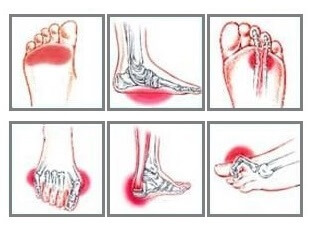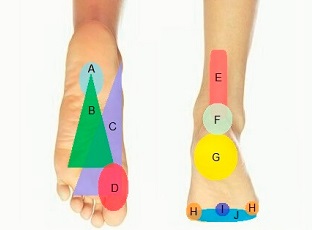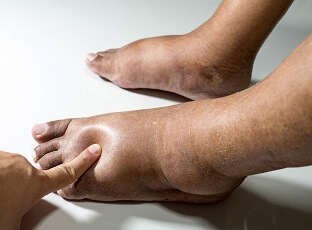- Home
- Foot Pain Symptoms
- Itchy Feet
Itchy Feet: Common Causes & How To Treat Them
Written By: Chloe Wilson BSc(Hons) Physiotherapy
Reviewed By: FPE Medical Review Board
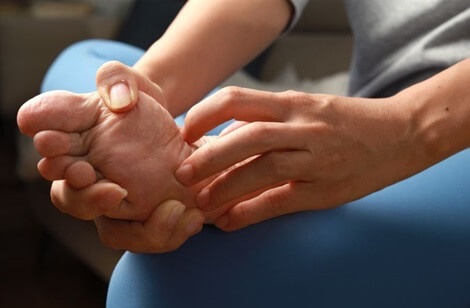
Itchy feet is a common, often frustrating condition, ranging from mild irritation to severe discomfort.
While often harmless, persistent or severe foot itching can indicate an underlying problem that requires prompt attention.
From fungal infections to chronic skin conditions and nerve issues, understanding the potential causes can help you address the issue effectively.
In this article, we’ll explore the most common causes of itchy feet, symptoms to watch for, treatment options, and prevention tips to keep your feet comfortable and healthy and answers to frequently asked questions.
Why Does My Foot Itch?
There are a number of possible causes of itchy feet. The medical term for itching is "pruritus", a sensation that triggers the urge to scratch. It can occur anywhere on the body, including the feet. The itching may or may not be accompanied by a foot rash.
Let’s start by looking at the most common causes of foot pruritus.
1. Athlete’s Foot
Athlete’s foot, aka tinea pedis, is one of the most common causes of itchy feet. Athlete’s foot is a common fungal infection that causes itching, burning, and flaking skin. It thrives in warm, moist environments, making it especially prevalent among people who wear tight shoes, have sweaty feet or frequent public areas like gyms and pools.
Key symptoms of athlete’s foot include:
- Red, scaly, or peeling skin (especially between the toes)
- Blisters or sores
- Foot Itching, burning or stinging sensations
Athlete’s foot can typically be treated with over-the-counter antifungal creams, powders, or sprays. Severe cases may require prescription medications. Keeping feet clean and dry is essential for recovery and preventing recurrence.
Find out more about athlete’s foot symptoms, causes and treatment in the Tinea Pedis section.
#CommissionEarned from Amazon on qualifying purchases
2. Dry Skin
Dry skin, or xerosis, is a frequent cause of foot itching, especially during colder months when humidity levels drop. It can also result from excessive washing or using harsh soaps that strip natural oils from the skin, or from nutritional deficiencies. You are more likely to get dry itchy feet as you age.
Common symptoms of dry itchy feet include:
- Flaky, rough patches of skin
- Cracked skin, which may lead to pain or bleeding
The best way to treat dry itchy feet is to moisturize your feet daily with a thick, fragrance-free cream. Avoid hot water when washing and opt for gentle, hydrating foot cleansers.
3. Peripheral Neuropathy
Another possible cause of foot itching is peripheral neuropathy, where there is damage to the nerves in the lower leg or foot. It causes abnormal sensations, including itching, tingling, or numbness in one or both of the feet.
Common symptoms that itching on the feet is due to peripheral neuropathy include:
- Persistent foot itching or tingling that doesn’t go away
- Burning or sharp pain in the foot
- Numbness or weakness in the feet
Treatment for itchy feet from peripheral neuropathy usually involves medications such as gabapentin, antidepressants or steroids to help reduce nerve-related symptoms. Applying creams will not help reduce itching on the feet as there is no problem with the skin itself.
Find out more about Peripheral Neuropathy.
4. Eczema
Another common cause of dry itchy feet is Eczema, aka atopic dermatitis, a skin condition that can affect any part of the body, including the feet. Foot eczema is a chronic condition that often flares up due to allergens, irritants, or stress.
Common symptoms of foot eczema include
- Dry, red, thickened, inflamed patches of skin, typically around the toes, under the foot and on the heel
- Intense itching, that often gets worse at night
- Recurrent episodes are common and foot itching is often the first sign of a flare-up
Treatment for foot eczema focuses on reducing foot itching and inflammation during a flare-up and improving skin moisture in between episodes. Using emollient creams, steroid ointments and anti-histamines as prescribed by a doctor can really help. Also avoid known triggers and keep the skin well-hydrated.
Find out more about Foot Eczema.
5. Contact Dermatitis
Itching on the feet can also be caused by contact dermatitis. Contact dermatitis occurs when the skin reacts to certain irritants or allergens, such as latex, detergents, cleaning products or fragrances.
Common symptoms of contact dermatitis include:
- Localized redness and swelling
- Itchy, blistering foot rashes
- Skin peeling or cracking
Treatment for contact dermatitis starts with identifying and eliminating the irritant or allergen. Over-the-counter topical steroid cream e.g. hydrocortisone, and antihistamines can help alleviate symptoms.
Find out more about the different types of Contact Dermatitis.
6. Psoriasis
Psoriasis is an autoimmune condition that attacks healthy skin cells, causes the skin to regenerate too quickly, leading to thick, scaly patches. While more common on other parts of the body, it can affect the feet often causing intense foot itching.
Symptoms of psoriasis are often widespread with:
- Itchy, silvery, scaly plaques
- Red, inflamed patches on the skin
Psoriasis treatments include topical steroid creams, emollients, salicylic acid, or systemic medications like retinoids or light therapy for severe cases. Regularly moisturizing the skin can also reduce foot itching and dryness.
7. Diabetes
Diabetes is a chronic condition characterized by high blood sugar levels due to insufficient insulin production or use. Diabetes can often lead to dry skin, poor circulation, and nerve damage, all of which may contribute to itchy feet. Itchy skin in diabetics may also indicate a fungal infection or other complications.
Common foot symptoms of Diabetes include:
- Persistent foot itching, often accompanied by dryness
- Tingling or burning foot pain
- Loss of sensation/feeling in the feet
- Ulcers and slow-healing wounds
Managing blood sugar levels is crucial for reducing symptoms with Diabetes. Moisturizing regularly can help treat dry, itchy feet associated with diabetes. It is really important to regularly inspect your feet for any signs or infection, open wounds or neuropathy if you are diabetic and seek immediate medical attention if you discover any problems.
Other Causes Of Foot Itching
There are a number of other less common causes of itchy feet including:
- Hookworm: A parasitic infection that can cause severe foot itching and a rash as the larvae penetrate the skin, often from walking barefoot on contaminated soil.
- Scabies: A highly contagious skin condition caused by mites burrowing into the skin, leading to intense itching and red bumps.
- Burns: Healing burns, especially on the feet, can cause itching as the skin regenerates.
- Insect Bites: Bites from insects like mosquitoes or fleas can result in localized foot itching and swelling.
- Vitamin Deficiency: Deficiencies in vitamins like B12 or iron can cause generalized itching, including on the feet.
- Pregnancy: Hormonal changes during pregnancy can lead to itchy skin, particularly on the feet and hands.
- Medications: Certain medications, e.g. penicillin or opioids, may cause side effects like foot itching as an allergic reaction.
- Liver Disease: Conditions affecting the liver can result in a build-up of bile salts, leading to generalized itching, including on the feet.
- Kidney Disease: Uremic pruritus, a common symptom in advanced kidney disease, causes widespread itching.
Symptoms of Itchy Feet
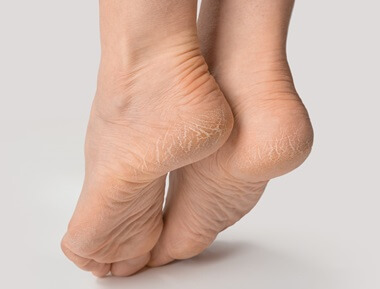
The symptoms of itchy feet vary depending on the underlying cause but common signs include:
- Persistent or intermittent foot itching
- Redness, swelling, or rashes on the skin
- Cracked, dry, or peeling skin
- Burning or tingling sensations in the feet
If your itching on the feet is severe, persistent, or accompanied by other symptoms like pain, swelling, or discharge, it’s important to seek medical advice.
How To Treat Itchy Feet
The treatment for itchy feet depends on the underlying cause but general treatment strategies include:
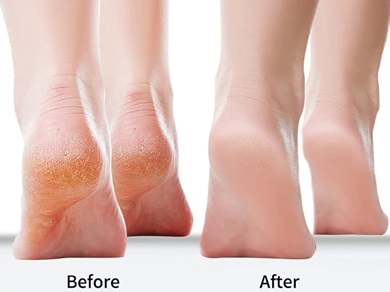
- Topical Creams: Antifungal, steroid, or emollient creams can alleviate foot itching, particularly with dry, irritated skin.
- Medications: Oral antihistamines, antifungals, or nerve pain medications may be prescribed for specific conditions.
- Lifestyle Adjustments: Keeping feet clean, dry, and moisturized can help prevent many common causes of an itchy foot.
- Avoiding Triggers: Identify and avoid allergens, irritants, or materials that may cause a reaction.
How To Prevent Foot Itching
Preventing itchy feet involves taking good care of your skin and avoiding potential irritants. Here are some top tips to avoid common causes of foot itching:
- Wash your feet daily with gentle soap and lukewarm water
- Dry your feet thoroughly, especially between the toes
- Wear breathable, moisture-wicking socks and shoes
- Moisturize your feet regularly to prevent dryness
- Avoid walking barefoot in public areas like gyms or pools
- Use hypoallergenic products to minimize the risk of irritation or allergies
FAQ's About Itchy Feet
1. What Causes Itchy Feet At Night?
1. What Causes Itchy Feet At Night?
Itchy feet at night are often caused by conditions like dry skin, eczema, athlete's foot, or even peripheral neuropathy. The body's natural inflammatory response may also heighten sensations at night.
2. Can Stress Cause Itching On The Feet?
2. Can Stress Cause Itching On The Feet?
Stress can exacerbate skin conditions like eczema and psoriasis, which can lead to itchy feet. Stress may also cause heightened awareness of itching or irritation.
3. When Should I See A Doctor For Itchy Feet?
3. When Should I See A Doctor For Itchy Feet?
You should see a doctor if your itching on the feet is severe, persists for more than two weeks, is accompanied by symptoms like swelling, pain, discharge, or signs of infection, or if you have diabetes.
4. Is Itchy Skin Between Toes Always Athlete's Foot?
4. Is Itchy Skin Between Toes Always Athlete's Foot?
While athlete's foot is a common cause, other possibilities include eczema, psoriasis, or contact dermatitis. A doctor can help confirm the diagnosis.
5. Can Allergies Cause Foot Itching?
5. Can Allergies Cause Foot Itching?
Yes, allergies to materials like shoe components, detergents, or other irritants can cause contact dermatitis, leading to itchy feet.
6. Is Itchy Feet A Symptom Of Diabetes?
6. Is Itchy Feet A Symptom Of Diabetes?
Yes, foot itching can be a symptom of diabetes due to dry skin, poor circulation, or complications like peripheral neuropathy or fungal infections. If you are diabetic, it is really important to regularly inspect your feet and see your doctor as soon as possible if you notice any problems.
7. What Are The Best Home Remedies For An Itchy Foot?
7. What Are The Best Home Remedies For An Itchy Foot?
Common home remedies for a itchy foot include soaking the feet in cool water, applying a moisturizing lotion, using over-the-counter antifungal creams, and avoiding known triggers or allergens.
8. Do Certain Shoes Cause Itchy Feet?
8. Do Certain Shoes Cause Itchy Feet?
Yes, tight or non-breathable shoes can trap moisture and heat, leading to fungal infections or irritation. Shoes made of materials you are allergic to can also cause contact dermatitis.
9. What Deficiencies Cause Foot Itching?
9. What Deficiencies Cause Foot Itching?
Deficiencies in certain vitamins and minerals, such as vitamin B12, iron, or vitamin D, can lead to itchy feet by affecting nerve function, skin health, or immune response.
10. Can Itchy Feet Be A Sign Of A Serious Health Condition?
10. Can Itchy Feet Be A Sign Of A Serious Health Condition?
Persistent foot itching may indicate underlying conditions like diabetes, nerve damage (peripheral neuropathy), or autoimmune diseases such as psoriasis. Seeking medical advice is important if symptoms persist.
Itchy Feet Summary
Itchy feet can arise from a variety of causes, including fungal infections, dry skin, nerve conditions, or chronic illnesses like diabetes. Identifying the root cause is key to effective treatment and long-term relief.
With proper care, treatment, and preventive measures, you can manage itchy feet and keep your skin healthy and comfortable. If your symptoms persist or worsen, consult your doctor.
You may also be interested in the following articles:
Related Articles
Page Last Updated: 8th January, 2025
Next Review Due: 8th January, 2027
